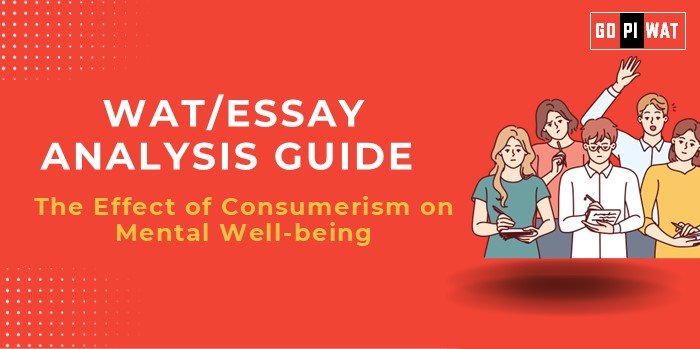📋 WAT/Essay Analysis Guide: The Effect of Consumerism on Mental Well-being
🌐 Understanding the Topic’s Importance
Consumerism affects mental health globally, intertwining economic practices with psychological impacts. For B-schools, understanding this dynamic equips students to tackle challenges in marketing, finance, and social responsibility.
📝 Effective Planning and Writing
- ⏱️ Time Allocation:
- Planning: 5 minutes.
- Writing: 20 minutes.
- Review: 5 minutes.
- 📚 Preparation Tips:
- Research mental health statistics.
- Identify responsible consumption strategies.
💡 Introduction Techniques
- 📊 Contrast Approach: “While consumerism boosts economies, it also correlates with a 25% rise in anxiety disorders worldwide (WHO, 2023).”
- ✅ Solution-Based Approach: “Encouraging mindful consumption may reduce the mental strain caused by unchecked consumerism.”
- 🕰️ Timeline Approach: “From the industrial revolution to modern-day influencer culture, consumerism has continually shaped and strained mental health.”
📖 Structuring the Essay Body
- Achievements: Discuss economic growth, innovation, and global connectivity.
- Challenges: Highlight mental health issues, debt, and environmental costs.
- Future Outlook: Advocate for minimalism, sustainable practices, and financial education.
✍️ Concluding Effectively
- ⚖️ Balanced Perspective: “Consumerism, while a driver of progress, demands a balance to safeguard mental health.”
- 🌏 Global Comparison: “Countries like Denmark show that sustainable practices can coexist with high standards of living.”
📊 Analyzing Successes and Shortcomings
Achievements:
- 📈 Economic advancements.
- 🌐 Enhanced global connectivity.
Challenges:
- 🧠 Rising stress and anxiety levels.
- 💳 Increasing debt burdens.
🌍 Global Context:
- 🇩🇰 Denmark and Sweden’s models emphasize sustainability and well-being.
🎯 Recommendations for Sustainable Progress
- 📘 Promote financial literacy.
- 📺 Regulate predatory advertising.
- 🏢 Encourage corporate responsibility through ethical marketing.
✍️ Sample Short Essays
1. Balanced Perspective:
Consumerism has spurred global economies, yet it strains mental health through debt and dissatisfaction. Addressing these challenges requires innovative strategies blending economic incentives with mental health awareness.
2. Solution-Oriented:
Minimalist lifestyles and responsible marketing practices can mitigate the psychological toll of consumerism, fostering a healthier, more equitable society.
3. Global Comparison:
Denmark’s emphasis on well-being over material wealth showcases how balanced consumption can lead to mental and societal prosperity.


